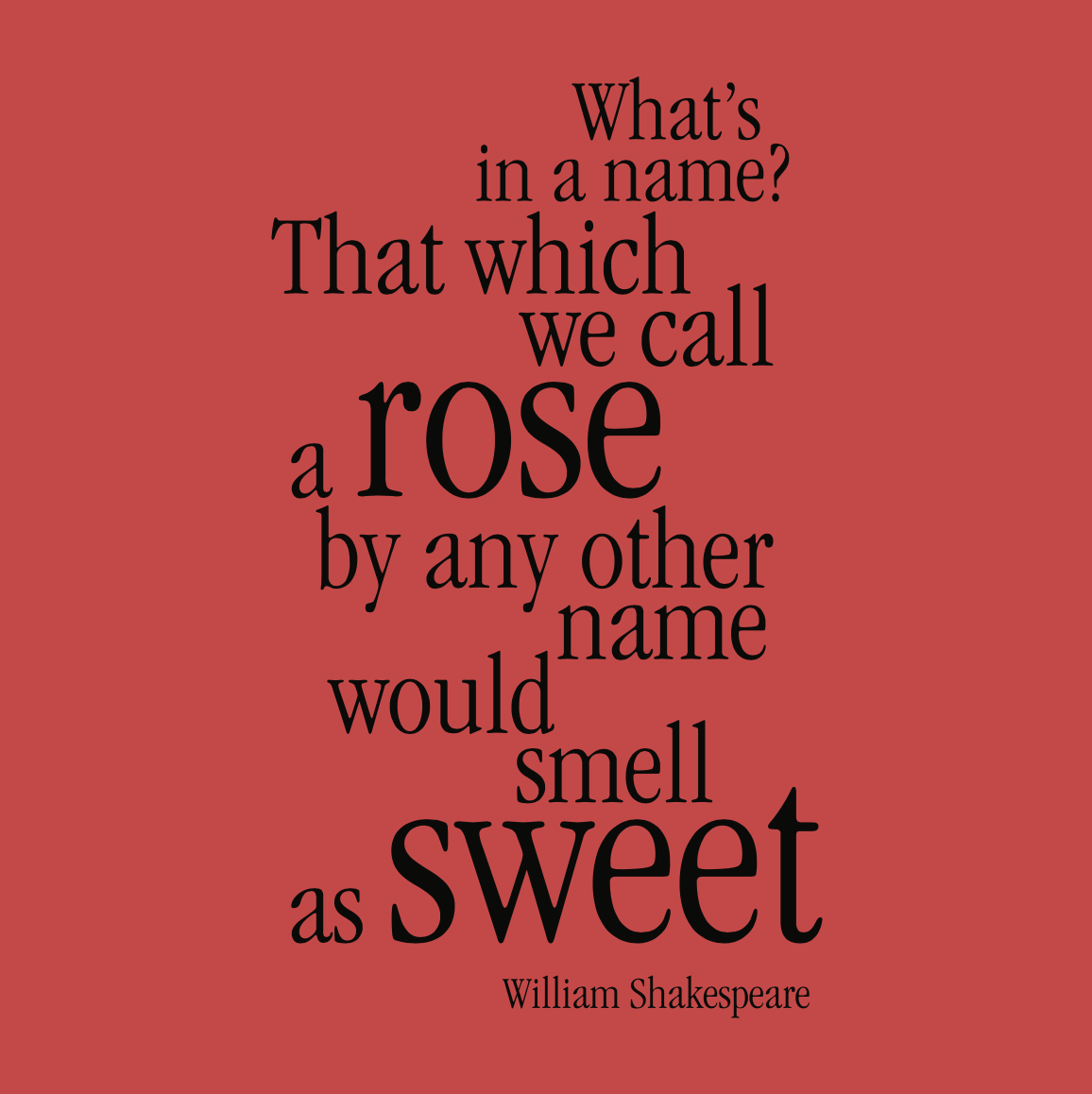What’s in a name? Well, quite a lot as it happens. Just ask Juliet in Shakespeare’s most famous tragedy. As a Capulet, Juliet is bound by her family’s hatred of rivals, the Montagues. But when she meets her heart’s desire – the silver-tongued Romeo, who happens to be a Montague – she is forced to ponder this very question and asks:

‘What’s in a name? That which we call a rose, by any other name would smell as sweet.’
Her conclusion is that Romeo’s name is of no importance, i.e. someone’s name is arbitrary in comparison to their intrinsic value. She loves him for what he is, not who he is.
Of course, while the intrinsic values of our business are important, we nonetheless all have to call ourselves and our organisations something. Like Romeo, who we are shouldn’t be important, but it is. There’s no getting away from that and as such, we should give our titles some serious consideration.
But perhaps we should question why the need for a title in the first place? Among other things it gives us a sense of identity for ourselves in society. It’s a helpful icebreaker at dinner parties and on a practical level it enables others to categorise and find us. As women we should also celebrate that people actually ask us in the first place – for so many years and in many societies it was naturally assumed that, other than housekeeping and childcare, we didn’t actually ‘do’ anything.
For founders or entrepreneurs, a good – or ‘memorable’ name – helps consumers identify your products and remember them. Likewise, it should reflect what your business does; financial advisors might be conservative or serious, discos and entertainment venues fun or frivolous, while other words and phrases have significant positive or negative connotations.
 This was all a lot easier when people took their names from their trade, like Cooper, Smith, Wright, Cook or Squire – it was obvious who they were and what they did for a profession. Today it can be a little more complicated and there are certainly a few, shall we say, ‘creative’ job titles out there according to Google, from Wizard of Want (marketing director) to Number Ninja (er… accountant) and Chief Beverage Officer (the humble bartender or barista) amongst others. Who knew inflation would affect job titles, too?
This was all a lot easier when people took their names from their trade, like Cooper, Smith, Wright, Cook or Squire – it was obvious who they were and what they did for a profession. Today it can be a little more complicated and there are certainly a few, shall we say, ‘creative’ job titles out there according to Google, from Wizard of Want (marketing director) to Number Ninja (er… accountant) and Chief Beverage Officer (the humble bartender or barista) amongst others. Who knew inflation would affect job titles, too?
And they are all very fine and fancy but not very illuminating for the customer. Unless of course you and your brand become so big and so well known that your name doesn’t matter. After all, Apple does not sell fruit and Amazon does not sell trees from the rainforest (although on second thoughts , it probably does…).

There’s a lot to be said by choosing something a little esoteric. It doesn’t box you in or pigeon hole you to limited specifics – it can mean what you want it to mean – while having a simple explanation to the question ‘what do you do’ might equally mean that you are creating a small, confined space in which to work, allowing no flexibility or imagination. On an internal levels, names can be inspiring and fun; at Wyseminds we have Project Ferris Wheel – it is a key initiative asking entrepreneurs for their recommendations (what goes around, comes around) – and the association with a fairground bred curiosity, excitement and unity, and was a change from the everyday.
These are all important considerations for entrepreneurs. How you see yourself and your role is key to how others see you, whether they take you seriously and choose whether to develop a relationship with you either as a colleague or a customer. What is your purpose? What are your values? Entrepreneurs should talk the language of business leaders. They should be clear, to the point, speak with clarity, conviction and pride. Make it clear you’re worth talking to. Ponder these things and when it comes to giving yourself a title, think carefully about what it means and what it says about your objectives. I’m the first one to admit that when I’m asked what I do it can flummox people. I’m not just a consultant, I’m not just an entrepreneur. I am a mentor, a coach and sometimes a sparring partner – but I’m clear in my own mind about what I offer.
To go back to Juliet, sometimes it’s more important to be clear about what you are and what you offer than who you are and in an ideal world the latter will follow the former. But the value of a perfectly pitched title cannot be underestimated – just remember, there’s nothing fun about pretending to be a problem wrangler or a retail jedi just to confuse the hell out of everyone. Not even Shakespeare would approve.
Fancy a coffee?
If you would like to understand a bit more about how we support entrepreneurs or have a growth-led question that you would like to discuss, reach out for a virtual coffee with me here.



 This was all a lot easier when people took their names from their trade, like Cooper, Smith, Wright, Cook or Squire – it was obvious who they were and what they did for a profession. Today it can be a little more complicated and there are certainly a few, shall we say,
This was all a lot easier when people took their names from their trade, like Cooper, Smith, Wright, Cook or Squire – it was obvious who they were and what they did for a profession. Today it can be a little more complicated and there are certainly a few, shall we say, 